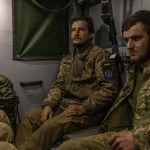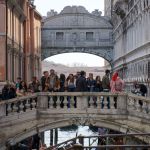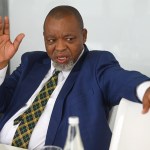By Tom Balmforth and Polina Nikolskaya
He spoke as the West took further measures to try to discourage Russia from going on the offensive in Ukraine.
The European Union agreed new sanctions that will blacklist more politicians, lawmakers and officials, ban EU investors from trading in Russian state bonds, and target imports and exports with separatist entities, the EU foreign policy chief said.
Germany put the brakes on a new gas pipeline and Britain hit Russian banks with sanctions. The Russian foreign ministry criticised the new measures against Russia as “illegitimate”.
With Western concern about Russia’s intentions fuelled by Moscow’s recognition of the two breakaway regions, NATO’s Stoltenberg said in Brussels: “Every indication is that Russia is continuing to plan for a full-scale attack of Ukraine.”
“We continue to call on Russia to step back … it’s never too late not to attack,” he told a news conference.
Russia’s parliament approved treaties with the two regions a day after Russian President Vladimir Putin said he was recognising their independence. Both adjoin Russia and have been controlled by Russian-backed fighters since 2014.
Putin said the territory covered the entire Donetsk and Luhansk regions of eastern Ukraine. He also signed a decree on deploying Russian forces there and on Tuesday Russia’s upper house of parliament formally granted his request to use troops abroad with immediate effect.
The prospect of a disruption to energy supplies and fears of war – stoked by reports of shelling in some areas and movements of unmarked tanks overnight in the rebel-controlled city of Donetsk – rattled international financial markets and sent oil prices surging to their highest level since 2014.
In Donetsk, some residents celebrated, with cars flying Russian flags and sounding their horns. But several blasts were heard in the city on Tuesday, and some people questioned whether Putin’s moves would bring peace. Read full story
Germany is Russia’s biggest customer for natural gas, and the decision by Chancellor Olaf Scholz to freeze the Nord Stream 2 pipeline – built but awaiting approval – was widely seen as one of the strongest measures Europe could take.
Scholz said he had asked his economy ministry to take steps to ensure that certification could not take place for now.
“This is a morally, politically and practically correct step in the current circumstances,” Ukrainian Foreign Minister Dmytro Kuleba tweeted. “True leadership means tough decisions in difficult times. Germany’s move proves just that.”
The Kremlin regretted Germany’s move and said it hoped the delay was temporary. Putin said Russia “aims to continue uninterrupted supplies” of energy to the world.
British Prime Minister Boris Johnson and French President Emmanuel Macron agreed on Tuesday to continue to work together to target those who supported what Johnson called Putin’s “aggressive approach”.
“Russia’s actions don’t just threaten Ukraine’s sovereignty, but are a blatant attack on freedom and democracy, the leaders agreed,” a joint statement said.
EU foreign policy chief Josep Borrell said Russia’s recognition of the two breakaway regions was an unacceptable breach of Ukraine’s sovereignty.
Meanwhile a witness told Reuters they had seen a military convoy of more than 100 trucks with soldiers heading in the direction of the Ukrainian border in Russia’s Belgorod region.
SANCTIONS
Russian parliamentary approval of friendship treaties with the two breakaway regions could pave the way for Moscow to establish military bases there.
U.S. President Joe Biden signed an executive order to halt U.S. business activity in them and further, potentially severe new U.S. sanctions and export controls were set to be announced on Tuesday. Read full storyL1N2UX085
Britain announced sanctions on three Russian billionaires and five banks. Read full story
Germany convened a call of foreign ministers from the Group of Seven industrialised nations, in which they agreed to condemn Russia’s actions, according to Japan’s foreign minister.
The United States initially limited itself to measures directly related to the separatist regions, apparently preferring to keep a larger sanctions package against Russia itself in reserve.
Russia’s recognition of the separatist areas, and Putin’s authorisation of what he described as peacekeeping troops there, still stops far short of the massed large-scale invasion that Western countries have said they fear Moscow is planning.
But it leaves Western leaders trying to guess Putin’s intentions for up to 190,000 troops deployed around Ukraine’s borders. Read full story
Western countries saw ominous signs in Putin’s rambling televised address on Monday, in which he characterised the Ukrainian leadership as illegitimate and the Ukrainian state as artificial.
Ukrainians consider such descriptions offensive and false. Kyiv is older than Moscow and, while parts of today’s Ukraine were captured by Russian tsars, other parts were not ruled by Moscow until World War Two.
Kristina Kvien, the top U.S. diplomat in Ukraine, said Putin’s “outrageous statements … were delusional, reflecting a warped vision reminiscent, not of a global leader, but of Europe’s worst authoritarians”.
President Volodymr Zelenskiy said Ukraine may sever diplomatic ties with Russia and urged allies not to wait for a further escalation to enact sanctions.
‘PUNISHMENT OF RUSSIA’
The West, which imposed sanctions on Russia after it annexed Crimea from Ukraine in 2014, appears likely to hold back on its toughest sanctions for now.
Russian Foreign Minister Sergei Lavrov brushed off the threat of sanctions.
“Our European, American, British colleagues will not stop and will not calm down until they have exhausted all their possibilities for the so-called punishment of Russia,” he said.
The Russian-backed separatists in Donetsk and Luhansk broke away from Ukrainian government control in 2014 and proclaimed themselves independent “people’s republics” after a pro-Moscow Ukrainian president was ousted in Kyiv.
“I know that the blood I spilled with my comrades and our labours and efforts and the losses of civilians were not in vain all this time,” Dmitry, a former member of a pro-Russian militia, said in Donetsk on Tuesday.
(Reporting by Tom Balmforth in Moscow and Polina Nikolskaya in Donetsk and Reuters bureaus; Writing by Timothy Heritage, Peter Graff and Angus MacSwan; Editing by Kevin Liffey and Grant McCool)





















 Become an Insider
Become an Insider
Comments - Please login in order to comment.